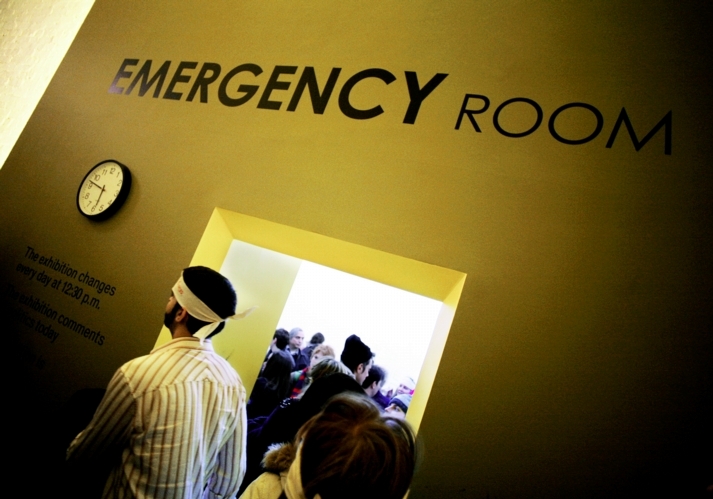
Up to half of the people treated at hospital emergency departments and trauma centers are under the influence of alcohol, experts say.
Here’s the good news: A recent study found that a brief counseling session from the emergency room physician can discourage problem drinking.
Now the bad: Many health providers are reluctant to do alcohol screenings in the ER due to laws that allow health insurers to deny coverage for treating patients who’ve been drinking.
In the study, published online in theAnnals of Emergency Medicine, nearly 600 emergency department patients who were identified as hazardous or harmful drinkers (defined for men as drinking more than 14 drinks per week or more than four on any single occasion, and for women as more than seven weekly drinks or three on any one occasion) took part in a seven-minute interview.
During the interview, an emergency department staff member described the link between alcohol use and the patient’s condition as well as guidelines for low-risk drinking.
Compared with those who received standard care, patients who took part in the sessions reduced their average number of weekly drinks significantly as well as their episodes of binge drinking and of drinking and driving over the next 12 months.
“In the emergency department on a weekend, all the cases may be drug- or alcohol-related, and yet we don’t do” screening and intervention, says Gail D’Onofrio, the study’s lead author, who is chair of emergency medicine at the Yale School of Medicine. “Our goal is to normalize this in the emergency department.”
But so-called alcohol-exclusion laws in more than half of the country — including Florida — permit insurers to refuse to pay for medical services related to alcohol or drug use, and that can derail hospitals’ best intentions, experts say. Faced with the prospect of not getting paid by health plans for care, some emergency department personnel might sidestep the problem by simply not testing patients’ blood or urine for alcohol.
Screening and counseling can be effective, says Larry Gentilello, a trauma surgeon who has published studies on injury prevention and substance abuse.
“Most of the people who are injured don’t need to go into treatment,” he says. “They aren’t alcoholics or alcohol-dependent. That’s why one counseling session can help them by talking about the risks of drinking.”
The extent to which alcohol-exclusion laws deter emergency medical personnel from screening and counseling patients for alcohol or drugs is unknown.
The laws have a long history. Since 1947, more than 40 states have passed measures allowing health plans to refuse to pay for care if the patient’s injuries occurred while he or she was under the influence of alcohol or, in some states, drugs. As people came to understand alcohol addiction and the possibility of treatment, however, it became clear that the laws were counterproductive. In 2001, the National Association of Insurance Commissioners recommended against them.
Since then, at least 15 states have repealed or amended their laws and now prohibit exclusions of coverage for drinking or drugs, according to data from the National Institute on Alcohol Abuse and Alcoholism.
Regardless of state law, self-insured companies that pay their employees’ health-care claims directly can refuse to cover employees for alcohol-related claims.
The laws have ensnared problem and occasional drinkers alike.
Gentilello describes the case of a Seattle woman who was celebrating her 25th wedding anniversary and had a few glasses of champagne at dinner with her family. It was a rainy night and she was wearing high heels. As she and her husband tried to hail a cab, she tripped on a curb, fell and broke her ankle. In the emergency department, her chart noted that she had had a few drinks. Her insurer refused to pay. In 2004, Washington state adopted a prohibition on alcohol-related claims exclusions.
It’s unclear how frequently insurers apply such laws to avoid paying claims. Susan Pisano, a spokeswoman for America’s Health Insurance Plans, a trade organization, says the group doesn’t know what its members do in this area. Cynthia Michener, a spokeswoman for Aetna, says that “to our knowledge,” the company doesn’t apply such exclusions. Other insurers, including UnitedHealthcare and Humana, didn’t provide information about their practices when queried.
But a professor who has written about such laws says there are indications that health plans continue to use them to deny payment.
“There are tons of these cases,” says Sara Rosenbaum, a professor of health law and policy at George Washington University’s School of Public Health and Health Services. “The only evidence we have suggests that these cases go on.”
“There’s no reason to think that insurers, eager to hold down costs, wouldn’t continue” to deny payment based on such exclusions, she adds.
51 Percent of adults 18 and older who drink regularly
50 Possible percentage of patients at emergency rooms under the influence of alcohol.
26 States that permit insurers to not cover policyholders at ERs who have been drinking (includes Florida, Alabama, Georgia, South Carolina).
Sources: CDC, NIAAA
Read more…
